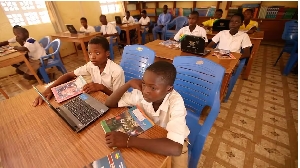 Image of pupils in a classroom
Image of pupils in a classroom
I write to express concern over recent reports indicating that our government has allocated a significant portion of its budget - approximately $325 million - towards providing tablets for high school students (sourced from cedi-rates-a social-media handle)
As an experienced educator who has served in four countries, including rapidly
developing economies like China and India, I believe it necessary to scrutinize this decision in light of competing educational priorities.
Research indicates that handwritten note-taking offers distinct cognitive advantages compared to digital alternatives.
Studies show improved memory retention, enhanced comprehension, and increased brain connectivity when students engage in handwriting exercises. Given these findings, one wonders whether our leaders took these benefits into account before opting for widespread tablet distribution.
Furthermore, recognizing global shifts towards reducing screen time for young learners, how does this initiative align with current best practices?
Beyond the debate on handwriting vs typing, questions persist regarding equity and necessity. Does every secondary institution boast sufficient IT infrastructure to enable optimal utilization of these devices? Haphazard introductions risk squandering precious resources and limiting pedagogical gains.
Instead, deliberate efforts should concentrate on building robust foundation-level structures capable of supporting holistic
technological integration across curricula.
Meanwhile, persistent challenges related to basic amenities remain largely unaddressed.
Classrooms under trees, stalled construction projects for community day schools, and deteriorating school meal programs merit equal, if not greater, attention. Prioritizing tablet acquisition over vital physical infrastructure improvements casts doubt on the administration's commitment to delivering quality education.
Additionally, the timing of this endeavor seems incongruous with other financial
obligations. For instance, outstanding payments owed to WAEC require immediate
settlement. Surely, resolving existing commitments warrants serious consideration alongside ambitious tech-driven undertakings.
Transparent communication channels become paramount in situations like this.
Stakeholders deserve clear explanations behind strategic moves affecting millions of future leaders.
Open dialogues nurture public trust, promote constructive criticism, and
ultimately lead to better policy formulation.
To summarize, careful examination of our educational spending reveals critical areas requiring intervention beyond tablet distribution. Balancing short-term excitement against long-term sustainability necessitates foresight and meticulous planning.
Let us strive for a system that values empirical evidence, fiscal responsibility, and social welfare above political expediency.
Thank you for engaging with me on this issue. Together, we can advocate for responsible leadership, sustainable growth, and equitable opportunities within our cherished
institutions.












